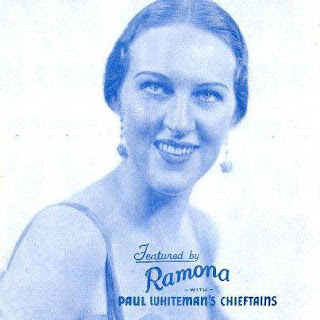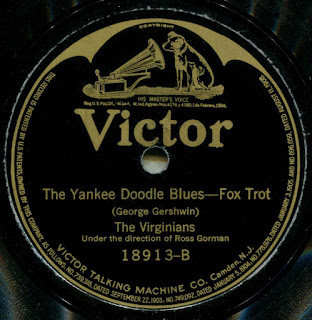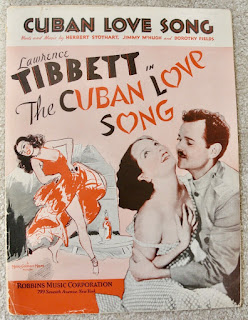We'll be hearing (eight times, no less!) from Paul Whiteman's more jazz oriented "satellite" band, the Virginians (led by Ross Gorman), and we have two terrific helpings of the amazing singer/pianist Ramona, aka Ramona Davies, aka Estrild Raymona Myers. "Estrild Raymona Myers" sort of lacks the direct simple and direct appeal of "Ramona" or "Romana Davies," so I can see why she shortened it. Born in Lockland, Ohio (in the southwestern corner of that state), Estrild/Raymona/Ramona was playing piano professionally at the age of 12. I can easily believe it. We'll hear Ramona accompanying herself on the 1933 "Paul Whiteman presents" Victor recording of Annie Doesn't Live Here Anymore, and tickling the ivories with Roy Bargy on the flip, Irving Berlin's Not for All the Tea in China. Back to the Virginians--imagine all the jazzy moments in Whiteman's 1920-1924 happening, not in select spots, but throughout the entire recordings, and you've got the Virginians. As far as I know, Ferde Grofe did the arranging for this group, and a good part of Grofe's genius as an arranger lay in his ability to put the Dixieland sound on paper; and so we have tightly structured but nevertheless "hot" jazz which sounds like the regular orchestra having a blast.
Other highlights include Grofe's riotous arrangement of Countess Maritza (1926), the flip side of PW's #1 hit, Birth of the Blues, which precedes it in our playlist. It goes without saying, given its nonstop quotations from Rhapsody in Blue, that Birth was also scored by Ferde. The quotations are so ingenious that what could have been a rather turgid treatment instead delights the listener. (Well, I think so, anyway.) And we have 1945 recreations of the classic early-1928 Bill Challis arrangement of San and the number one (in 1921) Grofe arrangement of Wang Wang Blues, recorded for the Capitol Records History of Jazz series. The former fares way better, and in fact outdoes the original (imo), while Wang Wang Blues lacks the brilliance of the 1920 recording, more or less taking an "Isn't this early stuff hokey?" approach to the project. I guess the plan was to demonstrate how far the Whiteman sound had evolved in eight years (don't have the Capitol liner notes handy, but I'm guessing that was the intention). Anyway, these were the first two recordings I heard by Whiteman, so they hold a special place in my musical memory. And... we have two fabulous concert orchestra performances from 1934, most likely scored by Roy Bargy: Peter De Rose's Deep Purple (in its pre-song form as a "symphonic jazz" gem) and the equally cool Park Avenue Fantasy, from which came Stairway to the Stars (with lyrics by Mitchell Parish).
A huge hit, and a showcase for cornetist Henry Busse, 1922's Hot Lips begins with a comical borrowing from Rachmaninoff, proceeding to a superb solo spot by Henry. Because jazz critics have tended to be 1) unkind to Whiteman's orchestra, and 2) often dismissive of the pop and jazz sounds of the late 1910s and early 1920s, Busse has gotten a rather raw deal, critically. That is, he's typically characterized as the anti-Bix Beiderbecke, a player with a corny and sweet sound who failed to fit in during the Challis/Satterfield/Malneck Whiteman period of the late 1920s. That he was a more than capable jazz blower (to use the jazz slang) seems like a fact lost to time, but we have the audio proof before us. It's a shame that nearly all "Did Paul Whiteman play real jazz or a faint facsimile of?" queries focus on the Beiderbecke period, since much of the jazziest happenings on PW 78s occurred prior to 1927.
Singer Jack Fulton shows up at least four times, most memorably on the slightly weird but delightful Cuban Love Song (1931), from the movie of the same title, and on the lovely Villa (1931), which sounds very much like a Grofe chart, though the Williams College site doesn't list it. Apologies to Bing Crosby fans, as Bing doesn't show up today, and mainly because the selections mostly occur outside of the Bing/Whiteman window. Ironically, Bing's firing from the band (due to his drinking and tendency to not show up on schedule) proved to be quite a solo career boost. Or a prelude to same.
Interesting note: Charles Wolcott, arranger of Straight from the Shoulder (1934), is credited with "bringing rock 'n' roll to the screen" in this 1987 AP obit. He had insisted on using Bill Haley's Rock Around the Clock in the 1955 Blackboard Jungle, which he also scored. How about that?
And we have vocalist Johnny Hauser expertly handling the lyrics to 1934's There's Nothing Else to Do in Ma-La-Ka-Mo-Ka-Lu (Hope I got that right). Expertly is the only way such lyrics can be handled, really. Last time, I described such numbers and arrangements as "pop Hawaii," and so I guess I'll stand by that. No idea on who supplied the charts.
To the Whiteman, Ramona, Roy, and Virginians (but no Bing). All tracks ripped from 78s in my overflowing collection.
DOWNLOAD: Paul Whiteman, Part 8 (1922-1945)
All by Paul Whiteman and His Orchestra, unless otherwise noted
Park Avenue Fantasy (A: Roy Bargy)--Concert Orchestra, 1934.
Memphis Blues (W.C. Handy)--The Virginians, Dir. by Ross Gorman, 1922
The Yankee Doodle Blues (Gershwin)--Same.
Nobody Lied--Same.
Villa (Lehar, A: Grofe?)--V: Jack Fulton, 1931.
Who Did You Fool After All?--The Virginians, Dir. by Ross Gorman, 1922.
Rose of the Rio Grande--Same.
There's Nothing Else to Do in Ma-La-Ka-Mo-Ka-Lu (But Love)--V: Johnny Hauser; 1934.
Bees Knees--The Virginians, Dir. by Ross Gorman, 1922.
San (A: Bill Challis)--1945 (Capitol 10026).
Wang Wang Blues (A: Grofe)--Same.
Birth of the Blues (A: Guess Who?)--V: Jack Fulton, Charles Gaylord, Austin Young, 1926.
Countess Maritza (A: Grofe)--Same.
Bygones--1922.
By the Sapphire Sea--1922.
Love in Bloom (A: Adolph Deutsch)--V: Jack Fulton, 1934.
Hot Lips (He's Got Hot Lips When He Plays Jazz)--Solo: Henry Busse, 1922.
Straight from the Shoulder (A: Charles Wolcott)--V: Joey Nash, 1934.
I Wish I Could Shimmy Like My Sister Kate--The Virginians, Dir. by Ross Gorman, 1922.
Lonesome Mama Blues--Same.
Deep Purple (Peter De Rose, A: Roy Bargy)--Concert Orchestra, 1934.
Cuban Love Song--Waltz (A: D. Savino)--V: Jack Fulton and the Romancers, 1931.
Annie Doesn't Live Here Anymore--Ramona and Her Piano (Paul Whiteman Presents), 1933.
Not for All the Tea in China--Roy Bargy and Ramona (Paul Whiteman Presents), 1933.
Lee



























